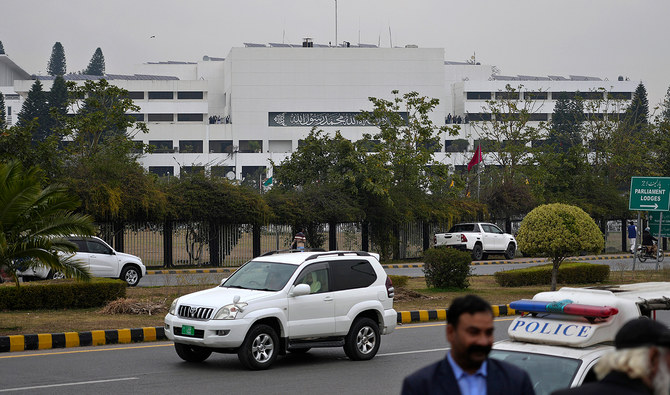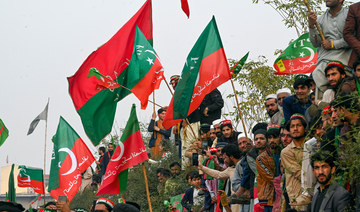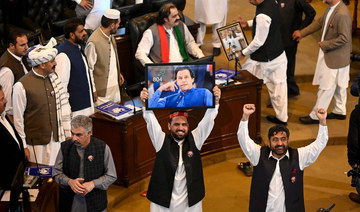ISLAMABAD: Members of Pakistan’s lower house of the parliament will elect a new prime minister on Sunday, the National Assembly secretariat confirmed on Thursday, hours after the assembly’s maiden session was held amid protests on the floor of the house by supporters of jailed former prime minister Imran Khan.
The assembly’s secretariat said legislators can submit nomination papers for the prime minister’s election at 2:00 p.m. on Saturday, March 2. It added that scrutiny of the nomination papers would begin from 3:00 p.m. on Saturday.
“The prime minister will be elected on Sunday, March 3, 2024,” the National Assembly secretariat said.
Pakistan’s Feb. 8 national elections were followed by widespread allegations of rigging and vote fraud, leading to nationwide protests by a number of political parties but most prominently by Khan’s Pakistan Tehreek-e-Insaf (PTI) that won the most seats in the National Assembly despite a state-backed crackdown against the party and the arrests of its leaders in the run-up to the vote.
The split mandate in parliament led to an agreement between Bilawal Bhutto Zardari’s Pakistan People’s Party and the Pakistan Muslim League-Nawaz (PML-N) of three-time premier Nawaz Sharif on Feb. 20 to form a coalition government, ending days of uncertainty and negotiations.
PML-N’s 79 and the PPP’s 54 seats together make a simple majority in parliament to form a government, and they have also roped in smaller parties in the coalition. Candidates backed by Khan’s PTI won 93 seats, but do not have the numbers to form a government.
Thursday’s session started with ruckus as soon as the national anthem ended and Khan-backed lawmakers, who have joined the Sunni Ittehad Council (SIC), surrounded the speaker’s podium.
“Who will save Pakistan? Imran Khan, Imran Khan!” PTI lawmakers chanted after the oath taking ceremony and as newly elected MNAs signed the NA register roll.
PTI lawmakers were carrying placards inscribed with the slogan, “Release Imran Khan,” and some were carrying his portraits and wearing Imran Khan face masks.
RESERVED SEATS
Not all members of the 336-member house took the oath on Thursday, with the apportioning of 70 reserved seats for women and minorities still pending adjudication by the Election Commission of Pakistan (ECP).
The commission will decide on allocating reserved seats to the SIC, which did not win any seats in the polls but was later joined by Khan’s successful supporters, who had contested as independents. The ECP completed hearings on the matter on Wednesday but has yet to deliver a ruling.
Other major parties including the PPP and PMLN have opposed the allocation of the reserved seats to the PTI-SIC alliance, saying the SIC was not a parliamentary party and could not claim seats.
Speaking on the floor of the house, PTI lawmaker Barrister Gohar Khan said parliament was “incomplete” as his party was yet to be allocated its share of reserved seats.
“You become the elected member when you enjoy trust of the public, and trust of the people is earned,” he said, alleging that rigging in the elections had compromised the PTI’s mandate and it had won 180 seats in parliament.
Barrister Khan said the PTI-SCI alliance deserved 20 women and three minority seats out of 70 reserved seats in the assembly.
The National Assembly will elect the speaker and deputy speaker on Friday.
“CHALLENGES AHEAD”
The coalition alliance has announced Shehbaz Sharif, the brother of three-time former prime minister Nawaz Sharif, as its candidate for the PM’s slot. Shehbaz is himself a former premier and replaced Khan when he was ousted in a no-confidence vote in parliament in 2022. Since then, Khan has been convicted of several offenses in what his supporters call politically motivated cases to keep him out of office.
The coalition alliance is backing Asif Ali Zardari of the PPP as their joint candidate for president when the new parliament and all the four provincial legislatures elect the successor of the outgoing President Arif Ali, a close Khan ally, in the coming weeks.
Shehbaz is expected to take over the country at the time when the new government would need to take tough decisions to steer the country out of financial crisis, including negotiating a new bailout deal with the International Monetary Fund. The current IMF program expires in March.
A new program will mean committing to steps needed to stay on a narrow path to recovery, but which will limit policy options to provide relief to a deeply frustrated population and cater to industries that are looking for government support to spur growth.
Other big moves include privatization of loss-making state-owned enterprises such as the flagship carrier Pakistan International Airlines (PIA).
Pakistan is also facing a troubling rise in militancy, which any new government will have to tackle. Lowering political temperatures will also be a key challenge as Khan maintains mass popular support in Pakistan, and a continued crackdown on his party and his remaining in jail would likely stoke tensions at a time when stability is needed to attract foreign investment to shore up the economy.


















